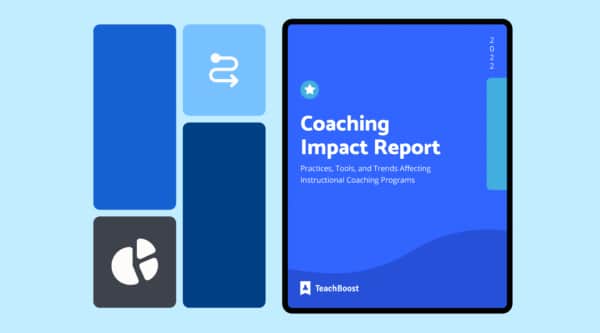


It may be April Fools’ Day, but we promise there are no tricks or pranks in this week’s roundup. Read on to learn a few tips for introducing yourself and your role to teachers and students, how to deliver upward feedback by coaching up the ladder, why it’s valuable for administrators to seek honest feedback from teachers, and more.
Are you ready to join over 3,000 of your coaching peers who receive fresh coaching content every Wednesday? Subscribe to our Weekly Coaching Roundup below.
{{cta(‘1623fdae-2dee-4cee-a003-34270e4a47e4′,’justifycenter’)}}
Coaching Up the Ladder
Caleb Allen highlights what a coaching cycle between ICs and their leadership teams looks like and a framework you can use to conduct your next one.
“When coaches help leadership teams analyze their instructional leadership’s impact, everyone in the school benefits! . . .
Coaching up the ladder means digging into the coaching cycle to help administrators and leadership teams analyze and understand their impact on teaching and learning. It begins by identifying a goal aligned to the school’s vision. From there, it moves to understand the instructional leadership actions that will help improve the vision and then analyzes the impact of instructional leadership on teaching and learning.”
Helping New Teachers Keep Going
Dana Haring and Tom Kelner share their “five Rs” that teachers can use to foster resiliency and stay motivated in their profession.
”
Frequent reflection, in fact, is a powerful tool for your growth as a teacher. Think about why things went the way they did: lessons, assessments, interactions, and activities. When things go well, consider how to replicate that success. When things don’t go as well, consider how to improve that element of the lesson.”
Side-Stepping Coaching Assumptions
Casey Watts passes along three ways ICs can introduce themselves to both teachers and students.
“As you might imagine,
introducing yourself to teachers is definitely much more challenging than introducing yourself to students. But, the more jovial, kind, and direct you can be, the easier it is to clarify your role. . . It goes deeper than simply giving a hello with a handshake and a, ‘Yes, I’m the new instructional coach, it’s nice to meet you.” Otherwise, you go into the year with assumptions laid upon you.”
How School Leaders Can Support New Teachers
PJ Caposey reflects on what he learned by simply asking teachers what support they wanted from administrators, and why their answers helped to make him more empathetic.
“Address the elephant in the room by reminding people of expectations and norms of our internal relationships . . .
Acknowledging differences of opinion and perspective is necessary. However, healthy cultures don’t allow their differences of opinion and perspective to define how they treat each other.
Healthy cultures persist and maintain that each member roots for and holds some responsibility for the success of each other member.”
5 Conversations for Professional Growth
Dr. Kristine Needham emphasizes the importance of being transparent and consistent in the definition and types of conversations you engage in with your staff.
“‘Professional conversations’, ‘learning conversations’, ‘professional learning conversations’, ‘coaching conversations’, ‘feedback conversations’ – these terms are in frequent usage, but are we sure what they mean and what the differences are, if any? It’s helpful when we use these terms in discussions with others, if we
have some awareness of the potential for confusion and make sure we look for some shared meaning and consistency.”
{{cta(’34b13594-505a-497a-8a75-16ae35acf14d’)}}
Have some instructional coaching news you’d like to share?
Share it with TeachBoost and we’ll highlight it here!
Stay Connected
News, articles, and tips for meeting your district's goals - delivered to your inbox.








